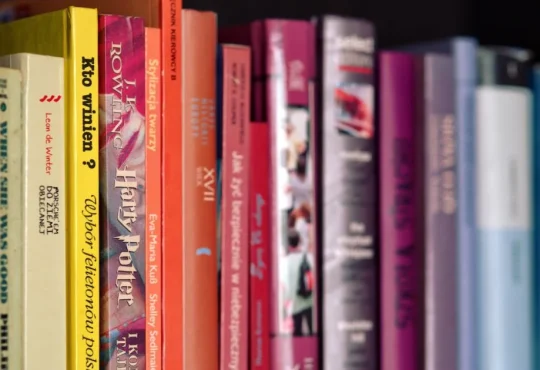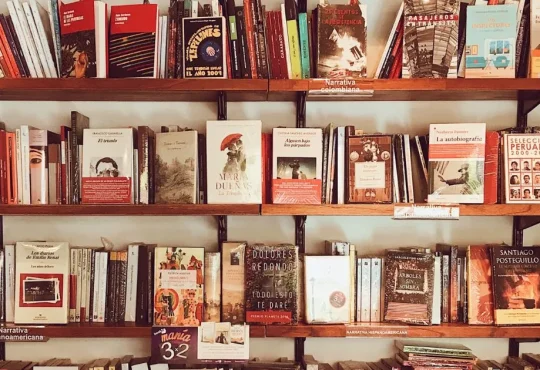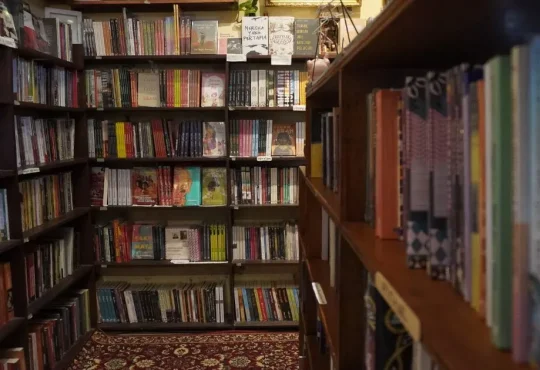Science fiction books offer an escape into worlds brimming with wonder and possibility. Packed with mutants, robots, alien civilizations, and more, these stories combine adventure, mythology, and science, blurring the lines between the real and the imagined. From epic galactic wars to personal explorations of love, loss, and identity, these books dive into important issues such as climate change, race, gender, sexuality, and class, pushing the boundaries of human experience. Explore the Top 13 Science Fiction Books for Fans of Futuristic Worlds, packed with epic adventures, thought-provoking ideas, and unforgettable characters!
The 13 Best Science Fiction Books of All Time
Presenting a ranked list of the greatest science fiction books of all time.
1. The Echo Wife
Written by Sarah Gailey
The Echo Wife is a gripping revenge thriller that blends the eerie mind-bending twists of Westworld with the unsettling perfection of The Stepford Wives. When geneticist Evelyn Caldwell discovers that her husband, Nathan, has been unfaithful, she uncovers an even darker truth: he used her cloning technology to replace her with a more docile version of herself. But things take a turn when Evelyn finds her clone standing over Nathan’s lifeless body, claiming it was an act of self-defense.
Forced into an unlikely alliance, the two women, one created and one betrayed, must work together to cover up the crime and protect Evelyn’s scientific career. With its twisty plot, the story raises deep questions about love, justice, and what it really means to be an individual.
2. The Calculating Stars
Written by Mary Robinette Kowal
Mary Robinette Kowal’s The Calculating Stars kicks off her alt-history series Lady Astronaut with a devastating meteorite strike in 1952 that wipes out millions, including the president and most government officials. In the aftermath, mathematician and pilot Elma York determines that a drastic climate shift will soon make Earth uninhabitable, and the only hope for humanity is to establish a colony on Mars. Elma dreams of becoming an astronaut, but the rampant sexism, racism, and antisemitism of the time hold her back, relegating her to the role of a “human computer.”
As the space race heats up, Elma and her fellow women astronauts must fight to break free of the barriers, keeping them grounded while navigating a society that devalues their contributions. With rich scientific detail and deeply relatable characters, The Calculating Stars takes readers on a thrilling journey to an alternate past, where the fight for equality and survival goes hand in hand.
3. Redshirts
Written by John Scalzi
Not all science fiction has to be serious, and John Scalzi’s Redshirts is the perfect example of that. Set on the starship Intrepid, the story follows a group of low-ranking crew members who realize that on every away mission, it’s always the ensigns who meet a grisly, pointless death, a clear nod to the infamous redshirts of Star Trek. With sharp wit and a dash of existential questioning, Redshirts turns its comic premise into a clever exploration of fate, fiction, and free will as the ensigns try to break free from the narrative that’s trapping them in a never-ending cycle of death.
4. Beautyland
Written by Marie-Helene Bertino
In 1977, Adina Giorno was born to a single mother in Philadelphia, but her life takes an unusual turn when, at age four, she’s “activated” by extraterrestrial beings from the distant planet Cricket Rice. Adina, tasked with reporting on human behavior, communicates through a whimsical fax machine in her bedroom, delivering sharp and often humorous insights into Earthlings, such as their discomfort with others’ happiness. As she matures, Adina grapples with feelings of alienation—both as an outsider at school and in her broader sense of belonging—crafting a poignant and funny narrative about loneliness, identity, and finding one’s place in the world.
5. Midnight Robber
Written by Nalo Hopkinson
In Midnight Robber, sci-fi seamlessly merges with Caribbean culture, illustrating how the worlds created are shaped by the ones known. Set on the advanced planet of Toussaint, where descendants of Caribbean immigrants live under the watchful eye of Granny Nanny, an all-powerful AI, the story follows Tan-Tan, who is forcibly taken to a planet of exiles by her abusive father. She escapes into the folklore-inspired world of the douen, becoming the Robber Queen, a mythic hero who steals from the rich to give to the poor, blending magic, music, and sci-fi in a powerful coming-of-age tale.
6. Star Maker
Written by Olaf Stapledon
Star Maker is a mind-bending science fiction novel about an Englishman who, while pondering the universe’s vastness, is unexpectedly launched into space. As he journeys through galaxies, he gains godlike powers and encounters bizarre alien civilizations. The journey ultimately leads to a mind-bending encounter with the Star Maker himself, unfolding like a cosmic creation myth that will leave you more confused and awe-struck than when you began, but also with a sense of wonder about the mysteries of existence.
7. Contact
Written by Carl Sagan
Carl Sagan, best known for his nonfiction work, wrote just one novel: Contact, which became a 1985 bestseller and later a film starring Jodie Foster. The story follows Dr. Ellie Arroway, a determined astronomer who decodes a deep-space transmission from a distant planet, leading the world’s nations to race against each other to build a mysterious machine. As the project unfolds, Sagan explores the tension between science and religion, suggesting that both may be seeking answers to the same fundamental question of whether humanity is alone in the universe, capturing a profound sense of wonder and the universal desire for connection.
8. Way Station
Written by Clifford D. Simak
In the backwoods of Wisconsin, Enoch Wallace, a 124-year-old hermit who looks no older than 30, runs a secret rest stop for intergalactic travelers in his old Civil War-era farmhouse. While his neighbors look the other way, trouble arises when the government learns of the mysterious man who never ages and lives in a house no human can enter, leading to a series of disastrous investigations. Clifford D. Simak’s Way Station is a masterful work of “pastoral science fiction,” blending classic sci-fi with Midwestern charm, creating a warm, wise, and bittersweet tale that transports you to a quiet cornfield at dusk, where the mysteries of the universe seem just a starry glance away.
9. The Complete Robot
Written by Isaac Asimov
Isaac Asimov’s Foundation series is a landmark in science fiction and rightfully earned the Hugo Award for Best All-Time Series in 1966, but it’s his work with robots that really highlights his genius. The Complete Robot, which collects 37 stories, including the iconic I, Robot, showcases Asimov’s groundbreaking ideas, including the famous Three Laws of Robotics concepts that would go on to influence both science fiction and real-world robotics. In these stories, robots range from hostile to heroic, evolving alongside Asimov’s vision and leaving a lasting impact on the genre and beyond.
10. How to Live Safely in a Science-Fictional Universe
Written by Charles Yu
Charles Yu, National Book Award winner and writer for Westworld, is one of the most inventive voices in speculative fiction today. His debut novel is a metafictional ride through alternate universes, following Charles Yu, a lonely time-machine mechanic for a company that profits by running parallel realities. As he navigates Minor Universe 31, where he meets a version of Linus Skywalker and grapples with the loss of his father, a time-travel pioneer, he accidentally shoots his future self, getting stuck in a time loop that may lead him to the father he’s been mourning. Trippy, clever, and surprisingly heartfelt, the novel explores our deep-seated longing to rewrite the past.
11. Brave New World
Written by Aldous Huxley
Aldous Huxley wrote many thought-provoking books, but Brave New World stands out as his most powerful and unsettling. In this dystopian future, people are numbed by endless pleasure through drugs, constant entertainment, and instant gratification while a totalitarian regime controls it all. The story follows Bernard Marx, a sleep scientist who begins questioning the meaning of life in a world without real passion or pain. This leads to a thrilling exploration of nonconformity and individuality that feels just as relevant and chilling today as it did when it was first published.
12. Frankenstein
Written by Mary Shelley
On a stormy night in 1816, 18-year-old Mary Shelley wrote Frankenstein, the groundbreaking story of Dr. Victor Frankenstein and his tragic creation. Shelley’s novel blends a timeless, eerie parable with the fears and anxieties of the Industrial Revolution, helping shape the foundation of the science fiction genre. The profound questions she explores about fear of the “other,” responsibility for our creations, and the ethical limits of science still resonate deeply, sparking new interpretations with each generation. From queer to transhumanist and feminist readings, Frankenstein continues to offer fresh insights, proving that even after two centuries, it remains a vital and thought-provoking exploration of humanity, morality, and the cost of progress.
13. The Martian Chronicles
Written by Ray Bradbury
If you haven’t read The Martian Chronicles, you’re missing out on Ray Bradbury’s masterpiece. With its poetic language and rich metaphors, it was a groundbreaking work that elevated science fiction into the realm of serious literature. Through a series of linked stories, Bradbury takes us to a post-nuclear Earth where Americans, driven by the same spirit of Manifest Destiny, venture to Mars only to find that the red planet has its mysterious power. Combining dark tragedy with moments of humor, The Martian Chronicles explores the human colonization of Mars while critiquing mid-20th-century myths of American exceptionalism, all wrapped in a dreamlike, almost fable-like style that still resonates today.
Spark Your Imagination With These Sci-Fi Books
These books are a gateway to extraordinary worlds, places where science, imagination, and deep human emotion intertwine. From the mind-bending twists of The Echo Wife to the sweeping cosmic journeys of The Martian Chronicles, each story offers something unique, whether it’s thought-provoking social commentary, complex characters, or adventurous escapism. These works not only transport readers to the future but also challenge reflection on present fears, dreams, and the ways in which the world is shaped. Whether seeking a thrilling tale or a profound exploration of humanity, these science fiction classics offer something for everyone, pushing boundaries while sparking imaginations to envision what could be.







